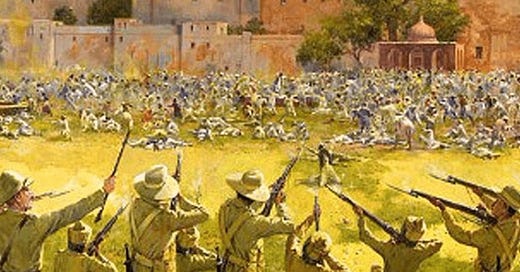Over 943,000 Indians served overseas during world War I.
Collective memory is conceptualized as a result of interaction of three types of historical factors:
(a) the intellectual and cultural traditions that frame all our representations of the past;
(b) the memory makers who selectively adopt and manipulate these traditions;
(c) the memory consumers who use, ignore or transform such artefacts according to their own interests.1
India’s massive contribution to World War I has remained a ‘failed’ collective memory—a ‘forgotten’ World War lost between the national movement against British colonial state on the one hand, and the trauma caused by the suspended civil liberties and the atrocities committed in Punjab culminating in Jallianwala Bagh2 [the Amritsar massacre] on the other.3
Ever since the First World War began in August 1914, the British government in India followed a double policy of repression and conciliation. Immediately, the colonial Indian government suspended all civil liberties by proclaiming Defence of India Rules—virtually enforcing something similar to Martial Law. Public opinion was continually irritated and provoked by the persistent endeavours to repress legitimate political propaganda and muzzle the Press.4
Ganachari, Aravind. (2020) “War Ferment in India: The Press, Publicity, Propaganda and Censorship.” In Indians in the First World War: The Missing Links, First Edition., 216–. Mathura Road: SAGE Publications Pvt. Ltd.
Jallianwala Bagh massacre, also known as the Amritsar massacre, took place on 13 April 1919. A large but peaceful crowd had gathered to protest against the arrest of pro-Indian independence leaders. In response to the public gathering, the British surrounded the Bagh with soldiers. After blocking the exit with troops, they were ordered to shoot at the crowd. At least 1000 people were killed and over 1,200 other people were injured.
Wagner, Kim. “A State of Rebellion (12 April).” In Amritsar 1919, 134–42. New Haven: Yale University Press, 2019.
Ibid., Ganachari, p. 16.
Ibid., p.319.





With every article from you that I read comes growing awareness of the extent of my ignorance.
As depicted in the 1982 film "Gandhi."